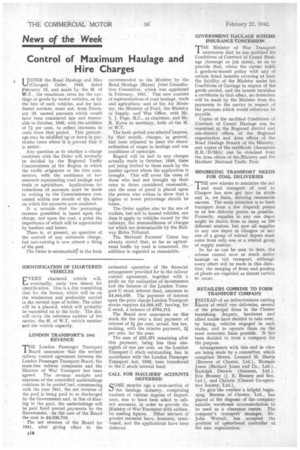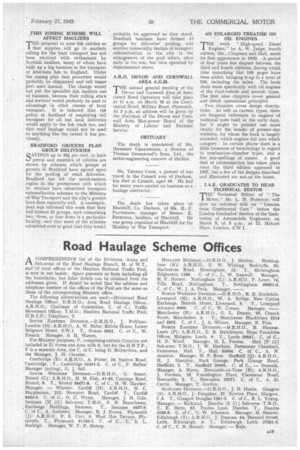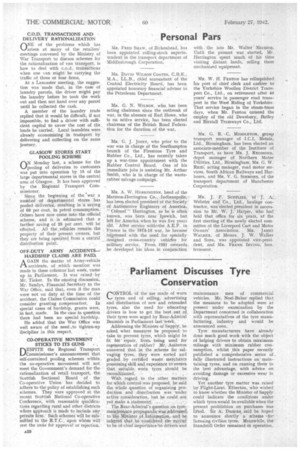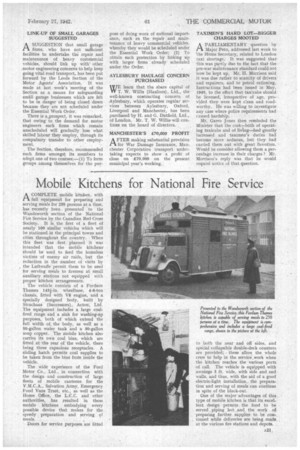IDENTIFICATION OF CHARTERED VEHICLES
Page 20

Page 21

Page 22

Page 23

If you've noticed an error in this article please click here to report it so we can fix it.
EVERY chartered vehicle will, eventually, carry two means bar identification. One is a disc resembling that for the licence, which will be on the windscreen and preferably carried in the normal type of holder. The other will be a placard, which will probably be varnished on to the body. The disc will carry the reference number of the carrier, the 54, of W.T. vehicle number Etnd the vehicle capacity.
LONDON TRANSPORT'S 1941 REVENUE
THE London Passenger Transport 1 Board announces that the revised railway control agreement between the London Passenger Transport Board, the main-line railway companies and the Minister of War Transport has been agreed. The revenue receipts and expenses of the controlled undertakings continue to be pooled but, commencing with the year 1941, the net revenue of the pool is being paid to or discharged by the Government and, in lieu of Sharing in the pool, the undertakings will be paid fixed annual payments by the Government. In the case of the Board the sum is £4,835,705.
The net revenue of the Board for 1941, after giving effect -Lb the
estimated operation of the financial arrangement provided for in the railway control agreement, together with a profit on the realization of investments and the balance of the London Transport 'C. stock interest fund, amounts to £4,844,659, The payment of interest upon the prior charge London Transport stocks requires £4,080,447, leaving, for C stock, a balance of £764,212.
The Board now announces on this stock for the year a final payment of interest of 21 per cent. actual, less tax, making, with the interim payment, 2/ per cent, for the year.
The sum of £25,371 remaining after this payment, being less than Oneeighth of one per cent, on the London Transport C stock outstanding, has, in accordance with the London Passenger Transport Act, 1933, been transferred to the C stock interest fund.
CALL FOR I4AULIERS' ACCOUNTS DEFERRED
SOITE months ago a cross-section of the haulage industry, comprising hauliers of various degrees of importance, was to have been asked to submit accounts, in order to provide the Ministry of War Transport with authen-tic costing figures. Other matters of greater moment have however, inter
veiled, and the applications have been deferred. GOVERNMENT HAULAGE SCHEME INSURANCE tONCESSION
THE Minister of War Transport announces that he has modified his Conditions of Contract of Casual Haulage (tonnage or job rates), so as to provide that, where the carrier holds a goods-in-transit policy with any of certain listed insurers covering at least the liability of the Minister under his Conditions of Carriage in respect of the goods carried, and the insurer furnishes a certificate to that effect, no deduction will be made by the Minister from the payments to the carrier in respect of the premium ,which would otherwise be payable.
Copies of the modified Conditions of Contract of Casual Haulage can . be examined at the Regional district and sub-district offices of the Regional organization and Area offices of the Road Haulage Branch of the Ministry: and copies of the certificate (document R.H./D/25A) can be obtained from the Area offices of the.Ministry and the Hauliers' National Traffic Pool, MINIMIZING TRANSPORT NEEDS FOR COAL DELIVERIES
THE new scheme to minimize the rail and road transport of coal to Glasgow has now 'got into its stride and is, we learn, showing reasonable success. The main intention is to limit transport from a few dispatch .points to as few delivery points as possible. Formerly, supplies to any one depot might be drawn from as many as 100 different sources, but now all supplies to any one depot in Glasgow or any one of a group of related depots must come from only one or a related group of supply sources.
• . So far as can be seen to date, the scheme -cannot save as much motor haulage as rail transport, although every effort will be made in this dimetion; the merging of firms and pooling of plants are regarded as almost certain to occur.
RETAILERS COMBINE TO FORM TRANSPORT COMPANY I NSTEAD of an indiscriminate cutting down of retail van deliveries, several of the principal firms in the Chester furnishing, drapery, hardware and allied trades have decided to take over, by hiring, vehicles engaged in such trades, and to operate them on the most economic basis possible. It has been decided to forth a company for the purpose.
Arrangements with this end in view are being made by a committee', which comprises Messrs. Leonard M. Harris (Browns of Chester, Ltd.), Norman Jones (Richard Jones and Co., Ltd.) , Rudolph. Denson (Densons, Ltd.), Eric Brassey (J. E. Brassey and Son, Ltd,), and Christie (Chester Co-operative Society, Ltd.)
To give the venthre a helpful beginning, Browns of Chester, Ltd., has placed at the disposal of the company suitable warehouse accommodation to be used as a clearance centre. The company's transport manager, Mr. John Worrall, has accepted the position of operational controller of the new organization.
FISH ZONING SCHEME WILL % AFFECT HAULIERS
-pm proposal to zone fish catches so J. that supplies will go to markets calling for the least transport has not been received with enthusiasm by Scottish hauliers, many of whom have built up a big business in the transport of Aberdeen fish to England. Under the zoning plan that procedure would probably be eliminated and rail transe port used instead. The change would not put the specialist fish hauliers out of business, because their rolling stock and Services would probably be used to advantage in other classes of local transport. It is believed that the policy in Scotland of employing rail transport for all but local deliveries would apply to the fish trade too, and that road haulage would not be used to anything like the extent it has previously.
BRADFORD GROCERS PLAN GROUP, DELIVERIES
SAVINGS up to 33i. per cent, in both petrol and numbers of vehicles are shown by schemes which 'groups of grocers in Bradford have agreed upon for the pooling of retail deliveries. Bradford has led the north-eastern region in the promptness with which its retailers have submitted transport rationalization schemes to the Ministry of Wa,r Transport and the city's grocers have done especially well. A correspondent was informed this week that they had formed 21 groups, each comprising two, three, or four firms in a particular locality, and that most of the schemes submitted were so good that they would
probably be approved as they stood. Bradford butchers have formed . 15 groups for deliveries' pooling, and another noteworthy feature of transport rationalization in the city is the enlargement of the pool which, since early in the war, has been operated by departmental stores.
A.R.O. DEVON AND CORNWALL AREA A.G.M.
THE annual general meeting of the
Devon and Cornwall Area ,of. Assodated Road Operators will take place at 11 a.m. on March /6 at the Continental Hotel, Millbay Road, Plymouth. At 3 p.m.. an address will be given by the chairman of the Devon and Cornwall Area Man-power Board of the Ministry of Labour and National Service.
OBITUARY The death is announced of MR. HERBERT GREENWOOD, a director of Thomas Greenwood's Sons, Ltd., the motor-engineering concern of Halifax.
MR, THOMAS Come, a pioneer of bus travel in the Consett area of Durham, has died at Concert, aged 69. He had for many years carried on business as a haulage contractor.
The . death has taken place at Blackhill, Co, Durham, of MR. H. F. PATTERSON, manager of Messrs. E.
Patterson, hauliers, of Blackhill. He was group organizer at Blackhill for the Ministry of War Transport.
AN ENLARGED TREATISE ON OIL ENGINES THE work " High-speed Diesel Engines," by A. W. Judge, fourth edition, 25s., Chapman and Hall, made its first appearance in 1933. . A period of four years has elapsed between the third and fourth editions, during which time something like 100 pages have been added, bringing it up to a total of 536, including • the index. The book deals more specifically with oil engines of the road-vehicle and aircraft types. The first nine chapters cover general and detail operational principles.
Two chapters cover design descriptions. As well as current types, there are frequent references to engines of technical note built in the early days, but it might be pointed out more clearly for the benefit of present-day students, for whom the book is largely intended, which engines fall into which category. In certain places there is a little looseness of terminology in regard to combustion-chamber types, and a few mis-spellings of. names._ A good deal of Modernization has taken place since the third edition appeared in 1937, but a few of the designs described and illustrated are not-of the latest.
, I.A.E. GRADUATES TO HEAR TECHNICAL EDITOR
THE' Technical Editor of " The Motor," Mr, L. H. Pomeroy, will :give an informal talk on " Lessons from Continental Cars " before the London Graduaies' Section of the Institution of Automobile Engineers, on March 8, at 3 p.m., at 12, Hobart Place, London, S.W.1.
CO.D. TRANSACTIONS AND DELIVERY RATIONALIZATION
ONE of the problems which has %./arisen at many of the retailers' meetings convened by the Ministry of War Transport to discuss schemes for the. rationalization of van transport, is how to deal with c.o.d, transactions when one van might be carrying the traffic of three or four firms.
At a Lancaster meeting,. the suggestion was made that, in the case of laundry parcels, the driver might pay the laundry before he took the work out and then not hand over any parcel until he collected the cash. . .
A member of the laundry trade replied that it. would be difficult, if not impossible, to find a driver with sufficient capital to cover the cost of the loads he carried. Local laundries were already economizing in transport by delivering and collecting on the same journey.
GLASGOW STORES START POOLING SCHEME
(IN Monday last, a scheme for the %.—/pooling of deliveriesto customers was put into operation by 1.5 of the large departmental stores in the central area of Glasgow. It has been approved by the Regional Transport Commissioner.
Since the beginning of the war a number of departmental stores has pooled deliveries,. resulting in a saying Of 66 per dent, in petrol consumption; Others have now come into the official scheme, and it is esaimated that a' further saving of 25 per cent, will be effected. All the vehicles remain, the property of their present owners, but they are being .operated from a central distribution point,
OFF-DUTY ARMY ACCIDENTS-.-: HARDSHIP CLAIMS ARE PAID
AGAIN the matter of Army-vehicle accidents, of which mention • was made in these columns last week, 'caritie up in Parliament. It was raised •by Mr., Tinker. In the etasuing diseussion, Mr. Sandys, Financial Secretary to the War Office, said that, even if the man were not on claty at the time of the accident, the Claims Commission could consider granting compensation. In special cases of hardship, grants were, in fact; made. In the case in question there had been no special hardship.
He added that the War Office was well aware of the need .to tighten-up 'discipline in this respect.
CO-OPERATIVE MOVEMENT STICKS TO ITS GUNS •..
DESPITE the Regional Transport L./Commissioner's announcement that self-contained pooling schemes within the co-operative movement will not meet the Government's demand for the rationalization of retail transport, the Scottish Sectional Board of the Co-operative Union has decided to adhere to the policy of establishing such schemes. They were approved at the recent Scottish National Co-operative Conference, With reasonaW qualification s regarding rural and other districts where approach is Made to include any private firm. Such seheinei will ;be stil'a' /flitted to the R.T.C:, 'Upon iVIthiri
rest the emirs for approval or rejection. LINK•UP OF SMALL GARAGES SUGGESTED
A SUGGESTION that small garage Pl. firms, who have not sufficient facilities to undertake the repair .and maintenance of heavy commercial vehicles, should link up with' other motor engineering concerns to help keep going vital road transport, has been put forward by the Leeds Section of the Motor Agents' Association. It was made at last week's meeting of the Section as a means for safeguarding small garage businesses which are felt to be in danger of being closed down because they are not scheduled under the Essential Work Order.
There is a.,prospect, it was remarked, that owing to the demand for motor engineers such firms which remain unscheduled will gradually lose what skilled' labour they employ, through its compulsory transfer to other employment.
The Section, therefore, recommended such firms amongst its members to adopt one of two courses:—(1) To form groups among themselves for the pur
pose of doing work of national importance, such as the repair and maintenance of heavy commercial vehicles, whereby they would be scheduled under the Essential Work Order; (2) To obtain such protection by linking up with largerfirms already scheduled under the Order.
AYLESBURY HAULAGE CONCERN PURCHASED
WE learn that the share capital of T. W. Willis (Hauliers), Ltd., the well-known contracting concern of Aylesbury, which operates regular services between Aylesbury, Oxford, Liverpool and Manchester, has been purchased by H. and-G. Dutfield, Ltd., of London. Mr. T. W. Williswill continue on the board of directors.
MANCHESTER'S £70,000 PROFIT
AFTER making substantial provision for War Damage Insurance, Manchester Corporation transport undertaking expects to show a profit of close on £70.000 on the present municipal year's working.
TAXIMEN'S HARD LOT—BIGGER CHARGES MOOTED
A PARLIAMENTARY question by ri Major Peto, addressed last week to 'the Home Secretary, related to London taxi shortage: It was suggested that 'this was partly due to the fact that the pre-war maintenance standard coufd not now be kept up. Mr. H. Morrison said it was due rather to scarcity of drivers' and repairers, and to petrol rationing. Instructions had been issued in May, 1940, to the effect that taxicabs should he licensed, irrespective of age, provided they were kept clean androadworthy-. He was willing to investigate any case where police requirements had caused hardship, •
Mr. Gas-co Jones then reminded the Minister that the cost—bOth of operating taxicabs and of living—had greatly increased and taximen's duties had become more arduous, but they had carried them out with great bievotiOn. Would he consider allowing them a percentage increase in their charges ? Mr. IVIorrison's reply was that he would require notice of that question.




















































